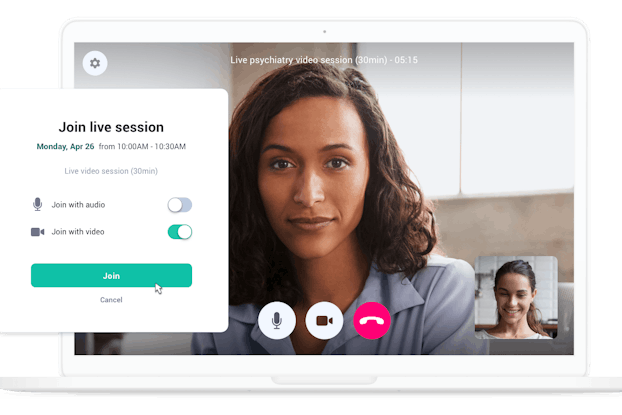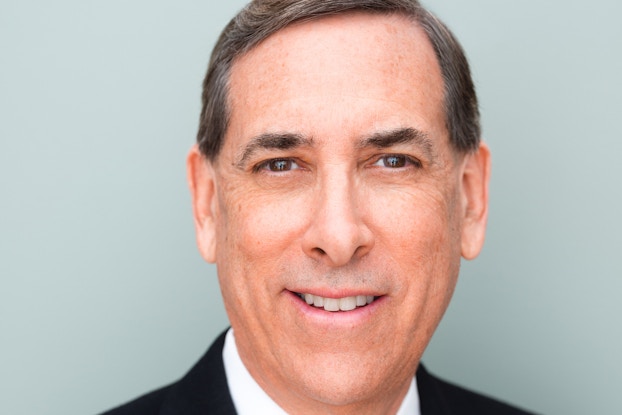
Why it matters:
- One in five adults are living with a mental illness, making the need for mental health services greater than ever.
- Talkspace provides therapy over text chat and audio and video connections.
- The company has found success shifting from a B2C model to a B2B model.
Since the COVID-19 pandemic started, more people are struggling with their mental health. Over one in five adults and youth have or have had a mental illness. The problem is bad for youth in the U.S., too: about 50% report symptoms of depression.
But it’s not the pandemic alone that’s causing it. For U.S. children and teens, feelings of persistent sadness and hopelessness and suicidal thoughts rose by 40% in the ten years leading up to the pandemic, fueled in part by growing concerns about social media, natural disasters, and mass violence.
For New York-based online and mobile therapy company Talkspace and its CEO, supporting children and young adults has become a major strategic priority as the company, founded in 2012, moves closer to profitability.
“For people ages 10 to 34, suicide is the second leading cause of death,” Talkspace CEO Jon Cohen, M.D., told CO—. “We’ve made students a moral imperative for the company to figure out how to better deliver mental health services to them.”
Talkspace provides mental health therapy over text chat and audio and video connections. It was the first company to offer therapy texting on a national scale. In 2021, Talkspace was joined by a flurry of new digital health companies as the industry flourished and digital health funding soared. Companies raised more than $29 billion.
“Covid accelerated telehealth, some people think by 10 years,” Cohen said. That’s especially true for primary care and mental health services. “Primary care has come down some,” he added, “but telehealth mental health has not. Mental health still makes up around 65% of all visits since it’s an easy, accessible way to access mental therapy.”
Market Research Future expects the digital mental health market to reach $69.44 billion by 2030 as the demand for digital mental health services and understanding of mental health issues continues to grow.
The [B2B] in-network side of our business is a huge differentiator from the competition and it’s one of the reasons that we’re growing.Jon Cohen, M.D., CEO of Talkspace
New Talkspace CEO navigates challenges to pave the path to profitability
Talkspace went public in June 2021, then navigated hurdles including the departures of its founders, a falling stock price, and mounting losses as it shifted away from its direct-to-consumer business.
But this past July it announced revenue increased 19% over the prior-year period to $35.6 million, driven in part by an 82% year-over-year increase in its business-to-business (B2B) revenue categories.
Now, as other digital health companies struggle to raise money and many have downsized, Talkspace expects to break even on an adjusted basis by the end of the first quarter of 2024 with more than $120 million in cash in the bank.
Cohen, a former surgeon and executive at Quest Diagnostics, took over as Talkspace CEO in September 2022. He attributes the company’s success to the B2B business shift, which started last year, a renewed focus on the patient and therapist experience, and continued product innovations.
“A year ago when I first got here, people said, ‘When will you run out of cash?’ Now they’re saying, ‘What are you going to do with $120 million?’ The story has changed.”
The shift to a B2B model: ‘That’s changed the dynamic massively, and it’s one of the reasons we’re growing’
In 2022, Talkspace pulled back on its direct-to-consumer business where patients pay for therapy out-of-pocket to center on insurance coverage.
The shift accelerated this year, Cohen said. Talkspace is now an in-network provider with major health plans including Optum, UnitedHealthcare, Cigna, and Aetna, and it covers 110 million lives across 50 states. That makes it the largest in-network provider for mental healthcare in the U.S.
In the third quarter of 2023, revenues from Talkspace’s B2B business surged 79% year-over-year. The company completed an estimated 228,600 therapy sessions through insurance, more than double the previous year’s 111,400.
“That’s changed the dynamic massively,” says Cohen. “The [B2B] in-network side of our business is a huge differentiator from the competition and it’s one of the reasons that we’re growing.”
With Talkspace, a major benefit is that patients are matched with a therapist within just a few days. “Time-to-therapist is a very big deal,” he said. Through insurance, therapy becomes more accessible for many people when the cost is only a co-pay.
At the same time, Talkspace is maintaining its consumer business. “There will always be people who want to buy therapy directly,” says Cohen, whether it’s because they have a high deductible or they prefer their employer not know they’re accessing services.

Supporting students and tapping AI to flag high-risk mental health patients
In addition to insurers and employers, Talkspace is also growing its relationships with universities and colleges that are looking to provide comprehensive mental health solutions to their students.
Educational institutions pay a per-student per-month fee for community members to access Talkspace’s services.
It’s a critical service, said Cohen, especially as a recent survey by Gallup and the Lumina Foundation shows some 41% of college students have considered stopping their coursework, with emotional stress playing a major role.
(In November, Talkspace signed a contract with New York City valued at $26 million to offer free teletherapy to teens ages 13 to 17 through a new service called Teenspace.)
Talkspace has found success with innovations like an algorithm it developed in 2019 in partnership with researchers at NYU Grossman School of Medicine. The technology identifies individuals at risk of self-harm or suicide.
Using machine learning capabilities, the Talkspace platform can identify language patterns on messages sent by patients consistent with high-risk behaviors that place individuals at risk for self-harm. The system triggers an urgent alert to the therapist. Data suggest the algorithm is 83% accurate.
In the last several years, Talkspace’s proprietary natural language processing (NLP) model has flagged around 32,000 Talkspace members whose written messages to their therapists have suggested risk of self-harm. Of those flagged who are continuing to receive care through Talkspace, over 50% have showed improved outcomes.
Talkspace has also added a feature therapists can use to match with patients based on their preferred, specific criteria—for example, working with people in their 40s and 50s or with kids. “We spend a lot of time on the journey,” Cohen said. “By matching therapists’ desires, it has really improved their experience.”
The company will continue to develop AI technology to support mental health providers and patients, enhance quality of care, and improve outcomes.
Cohen says Talkspace’s anticipated influx of cash opens the door to acquiring other companies. He’s optimistic about the business’s future growth prospects.
“You can’t go a day now without someone talking about mental health,” Cohen said. “Mental health’s time has come.”
CO— aims to bring you inspiration from leading respected experts. However, before making any business decision, you should consult a professional who can advise you based on your individual situation.
CO—is committed to helping you start, run and grow your small business. Learn more about the benefits of small business membership in the U.S. Chamber of Commerce, here.









